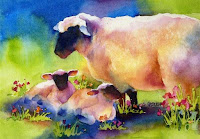 |
| Susan Crouch |
Forged from an unruly alliance of nomadic tribes beset with rivalries, resentments, and incompetent middle managers, running ancient Israel was no picnic. Add to that constant warfare with neighboring enemies, high-stakes palace intrigue, eight wives, a few assorted mistresses, and 18 children – you get the picture. David was over-extended.
Life for David and his people was complicated, dangerous, stressful, and sodden with grief. Sound familiar?
As beloved as David may be throughout Judaism and Christianity, he was far from perfect. As the saying goes, power corrupts, and absolute power corrupts absolutely. If it’s a paragon of virtue you want, look elsewhere. But if you want an eccentric brimming with the pathos, perception, and panache of a rock star, David’s your man.
On top of everything else David was also a poet of startling sensitivity and depth. His 23rd Psalm is a declaration, a prayer, a plea, a song, a dream, and an affirmation.
“The Lord is my shepherd, I shall not want./He makes me lie down in green pastures;/he leads me beside still waters;/he restores my soul./He leads me in right paths/for His name’s sake.” So it begins. The central metaphor is God as shepherd, and we as the vulnerable in need of guidance, sustenance, and protection. David’s idealized pastoralism draws us into a world where the generative bounty of nature extends beyond the food and water it provides – the restorative love of God pours forth from every blade of grass. And the holiness inherent in all things edifies our innate wisdom to choose the right path forward.
“Even though I walk through the darkest valley,/I fear no evil;/for you are with me;/your rod and your staff – /they comfort me.” Whether our problems are personal, (a dissolving marriage, a drunk driving conviction) or global (a pandemic with burgeoning death tolls), we long for the transcendent perspective of this passage: to recognize and acknowledge the divine presence with us, and within us. A rod and staff, shepherds tools, viscerally convey the practiced skill and ineffable wisdom of this innate divine guidance.
And true to his warrior lifestyle (for who can ever escape their lived context?) David closes with this: “You prepare a table before me/in the presence of my enemies;/you anoint my head with oil;/my cup overflows./Surely goodness and mercy shall follow me/all the days of my life,/and I shall dwell in the house of the Lord/my whole life long.” (Psalm 23, NSRV) Here we feel the world-weary maturity of the king – how he no longer wishes to conquer every enemy seeking instead the peace of coexistence. Not every conflict has to be resolved – sometimes the best we can hope for is that our conflicts be endured with a modicum of dignity and grace. How? By recognizing our infinite abundance: “my cup overflows.” As do all of ours. And finally, David’s glowing affirmations: “Surely goodness and mercy shall follow me all the days of my life.” When we know and embody these truths, we find not only the strength to endure the hard road we’re on, but the freedom to enjoy it.
[A version of this piece was first published in my "A to Zen" column in the January/February edition of Unity Magazine as "David's Poetic Affirmation," and is reproduced here with permission.]


